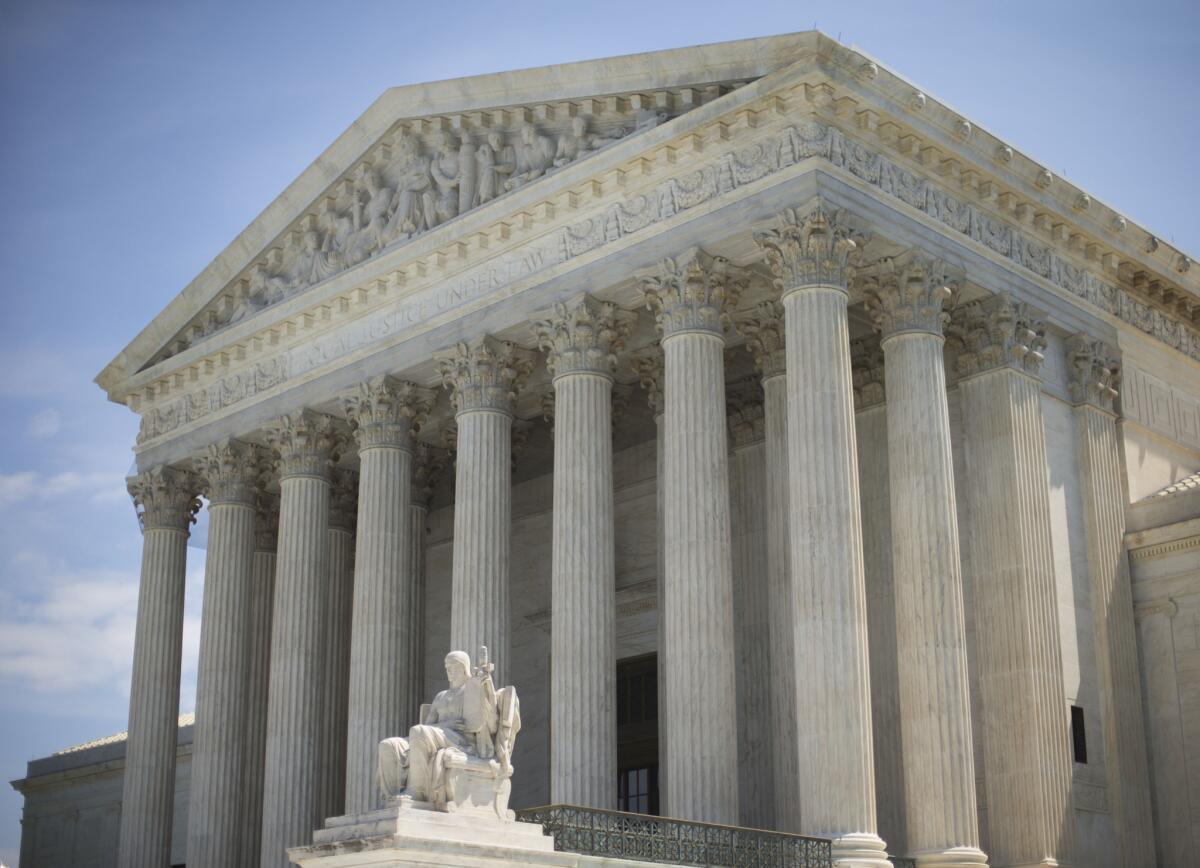Opinion: The Supreme Court’s muddy new ruling on the contraceptive mandate

- Share via
In a bizarre attempt to have it both ways, the Supreme Court held that a small evangelical Protestant college in Illinois did not have to include contraceptive coverage in employee health insurance even though it didn’t fill out the paperwork the government required for claiming an exemption. That paperwork, Wheaton College‘s lawyers argued, made the college complicit in providing coverage for morning-after pills and emergency contraceptives that violated the institution’s religious beliefs.
But the injunction issued by the court’s 6-3 majority also declared that it wouldn’t stop the college’s employees from obtaining contraceptive coverage from the college’s insurer. Once the college sent a letter to the government saying that it shouldn’t have to provide the coverage, the court held, the government was free to order the college’s insurer to provide birth control and related services with no out-of-pocket costs.
So how, exactly, is that different?
The 2010 Affordable Care Act requires insurance plans to cover without out-of-pocket costs certain preventive services, leaving many of the services to be specified by the U.S. Health Resources and Services Administration. After the latter included women’s contraceptives -- some of which are considered by abortion opponents to be abortifacients -- the Obama administration ginned up a procedure by which nonprofit religious employers (other than churches, which were already exempt) could exempt themselves from the requirement without leaving their female employees any worse off, coverage-wise.
It was supposed to work like this: Employers would submit a form to the government stating that they were a nonprofit that “holds itself out as a religious organization,” and that they opposed the requirement for religious reasons. They’d submit a copy to the government and to their insurance administrator or insurer. The insurer, in turn, would be obligated to provide the coverage at no extra cost to the employees.
Under the new procedure laid out in the Supreme Court’s order, Wheaton and, presumably, all like-minded religious nonprofits will now have to send a letter to the government saying they object to the mandate. The government will then tell their insurers that they are obligated to provide contraceptive coverage, at no extra cost, to those in the nonprofits’ insurance plans.
Yes, it will now technically be the government alerting insurers to provide the coverage, not the employer. But the court left intact, at least for now, the requirement that insurers provide contraceptive coverage at no out-of-pocket cost as part of every plan issued. The sole exceptions are the ones for religious institutions themselves and, as of Monday’s Hobby Lobby ruling, closely held corporations whose owners claim a religious exemption.
The majority noted that it wasn’t deciding the merits of Wheaton’s argument that it should be able to exclude contraception entirely from its employees’ coverage. Nevertheless, the dissenters — the court’s three female justices — argued that the majority was reversing the stance it had taken just three days previously in the Hobby Lobby ruling.
In that ruling, Justice Sonia Sotomayor wrote for the dissenters, the divided court had held up the administration’s work-around for religious nonprofits as a model for how not to violate the federal law protecting religious freedoms. By granting Wheaton an injunction, she wrote, the court was reversing itself, suddenly and sharply.
As for Wheaton’s objections, Sotomayor noted the analogy that the 7th Circuit Court of Appeals had drawn between Wheaton and a Quaker drafted into the Army who refuses to serve for religious reasons. The Quaker would be entitled not to serve, but he couldn’t stop the Army from drafting someone else to take his place.
“Any provision of contraceptive coverage by Wheaton’s third-party administrator would not result from any action by Wheaton,” Sotomayor wrote; “rather, in every meaningful sense, it would result from the relevant law and regulations. The law and regulations require, in essence, that some entity provide contraceptive coverage. A religious nonprofit’s choice not to be that entity may leave someone else obligated to provide coverage instead — but the obligation is created by the contraceptive coverage mandate imposed by law, not by the religious nonprofit’s choice to opt out of it....
“It may be that what troubles Wheaton is that it must participate in any process the end result of which might be the provision of contraceptives to its employees. But that is far from a substantial burden on its free exercise of religion.”
Despite Sotomayor’s passionate response, the real-world result appears to be no change for Wheaton’s employees, at least not yet. They’ll still receive contraceptive coverage as part of their health plan, with no separate premium or added out-of-pocket costs.
Clearly, the Hobby Lobby ruling wasn’t the end of the story as far as the Supreme Court and the contraceptive mandate. But as the court demonstrated Thursday on Wheaton’s injunction, sometimes the steps it takes appear larger than they really are.
Follow Healey’s intermittent Twitter feed: @jcahealey
More to Read
A cure for the common opinion
Get thought-provoking perspectives with our weekly newsletter.
You may occasionally receive promotional content from the Los Angeles Times.










